|
Intro
As late as recently our musical culture gave birth to a lot of myths.
At each stage of its development one can find some hidden layer, a
focus of attention, not completely reflected in documents and
artifacts. One of such enigmas is avant-garde jazz of pre- and
post-perestroika periods. Notwithstanding that this phenomenon was
developing during the hi-tech era, many of its key events have not
been recorded on video or in audio. While witnesses of those short and
wild times are still alive, such circumstance is taken for granted.
However, in the nearest future, the history of the Moscow alternative
scene of the 80's will be provided with new details and anecdotes,
both real and fictitious. Let's wait and see.
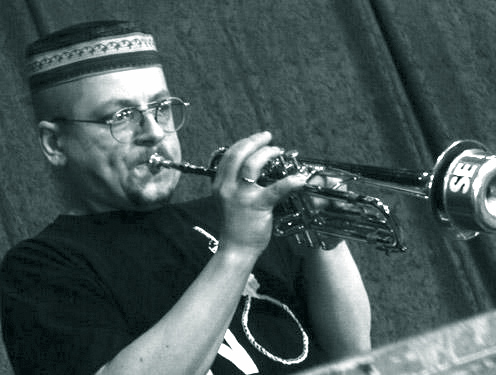
Andrei Solovyov Before and after the perestroika, many musicians took interest in
avant-garde jazz; there is a lot to remember. We can even speak about
the history of such a phenomenon as "new avant-garde jazz in Moscow.”
However, the concept of "Moscow avant-garde jazz" is contradictory and
paradoxical.
I believe that the main paradox of the history of Moscow, and maybe of
all national avant-garde jazz, is that many familiar reference marks
were considerably shifted: while in the rest of the world the avant-gardists were searching for alternative ways to protest against
bourgeois values of the consumer society, for our fellow nationals it
was an escape, curiously enough, to the bourgeois Western perception,
an attempt to join the Western civilization's values. It was a unique
situation. The first big tours of our new-jazz musicians and first
records released by Leo Feigin were intended not for the opposition,
not for the social underground, not for the leftists or reds, who used
to group around the avant-garde art in the rest of the world, but for
enlightened common people, festival goers, consumers of ECM production
(a West German record company, promoting a meditative fusion of jazz,
academic music and exotic folklore - editorial comment), who were
mainly interested in the enrichment of their outlook and seeing the
system breakdown. This was the consumer, who formed the situation of
emergence of Soviet avant-garde in the West, and our performers,
intentionally or unconsciously, tried to match those expectations -
the expectations that people from behind the 'iron curtain" would
bring some powerful emotional and intellectual impulse to renovation.
It should be kept in mind that appearance of Vladimir Chekasin,
Vyacheslav Ganelin and Vladimir Tarasov was a great event for the
provincial town Vilnius, and the performance of Mikhail Yudenich and
Vladislav Makarov in Smolensk was just a revolution in minds… In
Moscow, a huge city, the avant-garde scene could only exist as an
alternative environment, as "a world of processes rather than
results,” a world without stars but with communities and families. As
soon as the comprehension of this special place in the society
vanished or the feeling of environment was lost, music lost its
originality and self-sufficiency. Some people could blossom out,
bright records were released, and great concerts were held, but the
precious stem supporting everything was getting weaker and more
unreliable.
Time of Expectations
Moscow avant-garde jazz originated in the 60's-beginnning of 70's, and
we know about this period only by hearsay. They say that the legendary
Gevorgyan brothers played in this style: the composer and pianist
Evgeny and the contrabass player Andrey. Unfortunately, no traces of
their endeavors remained by the time of perestroika. For a couple of
times I listened to the joint project of Evgeny Gevorgyan with the
leader of the Academic Saxophone Quartet, Lev Mikhaylov, and their
performance was woeful. Probably, in the future, laurels of pioneers
will be returned to them, but none of them could be imagined as the
originator of the national new jazz. But when I listen to Evgeny
Gevorgyan's music from "XX Century Pirates" movie, I just can't hold
back my tears. Remember the scene, when Eremenko jumped overboard and
sent the pirates' ship to the bottom?
Generally, the inner attitude toward the music you've never heard is
very strange. I noticed that regularity reading Thomas Mann's novel
"Doctor Faustus": the description of music was very bright, though in
reality (as we know) Schoenberg's opuses do not sound as colourful and
tempting as described by Mann. Rather boring. Many our musicians could
not stay indifferent to American and European free-jazz of the 60's.
The saxophonist Alexander Pishchikov, Alexei Kozlov and Igor Saulsky
were obviously close to open and free forms. Progressively thinking
musicians were grouping around German Lukyanov. The saxophonist Yuri
Yurenkov can be considered a talented propagandist for Ornette
Coleman's ideas. The pianist Leonid Chizhik and the drummer Vladimir
Vasilkov, people from Lukyanov's toss, were playing freely in a way.
Though German Lukyanov had always considered avant-garde somewhat
dishonest and, apparently, just hated it.
In a word, many musicians in one way or another touched the Coleman's
type free-jazz, but later they acted as opponents to free
improvisations and free forms; alas, the place in the national music
hierarchy they hurried to occupy obliged them to be critical about
their juvenile experiments. Well, it was their business, but sometimes
it was a shame that musicians would not see and hear what would could
useful to them.
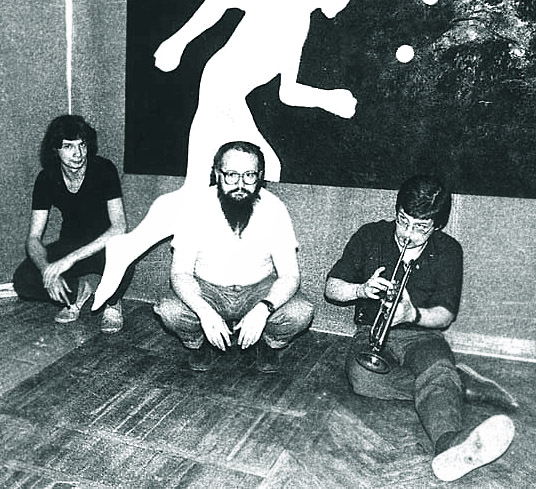
Bogdan Mamonov Nick Dmitriev Andrei Solovyov Lukyanov spent a half of his life side by side with avant-gardists. I
also shared the rehearsal base at the cultural center of the Moscow
Sverdlov's factory with them. Nikolay Dmitriev and the guitarist Misha
Yutkin used to organize concerts there (Yutkin was the art director of
this center; he played quite moderate, non-radical music, but always
welcomed much braver rock and jazz-musicians). Lukyanov was arrogant
and never listened for interesting phenomena, in my opinion, which
could timely galvanize his own cooled-down mastery. It was finally
understood that one couldn't count even on a short-term cooperation
with him. By the way, the bass player of "Moscow Composers'
Orchestra”, Oleg Dobronravov, used to play in Lukyanov’s Cadence
Ensemble, though not too long.
As a matter of fact, Moscow was ahead of its time: the local scene was
similar to the modern downtown New York – it was the synthesis of
rock-music, jazz, academic experiments, noise, electronic and other
genres I can't even identify. For example, in the end of the 80's, a
very good, interesting, absolutely contextual, alternative,
underground group called ZAiBI ("For anonymous and free art") appeared
and also went nowhere. On a semiprofessional (from the point of view
of the Composers' Union members), but clearly apprehensible level they
tried to synthesize different arts.
On the other hand, there was a person who was very important for the
Moscow underground scene, Sergey Zharikov, and the people grouped
around him and his band DK were musicians, artists, actors… All in
one, it was our Rock in Opposition, Lower East Side and maybe
something like a creative laboratory, formed in Great Britain around
the drummer Chris Cutler and Recommended Records. The main principle
was "not what, but how,” and it produced confidence in the experiment,
representatives of various genres and different musical traditions.
Alas! The irony of it is that all victories and achievements of the
Moscow avant-garde were movements away from this fruitful environment,
which was not realized in any more or less professional, bright,
clearly perceived, well-structured projects. The Borderline
As it happens during great social changes, on the eve of the
perestroika, many people (including musicians) believed that
everything was possible; indeed, many things could have been done, but
the majority of the participants just didn't see the prospects of the
new synthetic art. That is why some of them took another track, shown
by the jazz critic Efim Barban, who lived in Leningrad. In those days,
the others preferred an easier and more accessible way of
"explanatory" art, which led to the stages of big festivals (I don't
mention those who made business out of avant-garde). Generally, both ways meant the departure from the very fruitful, self-contained,
underground environment, where virtually all the significant
participants of the Moscow avant-garde were boiling in the end of the
70's - beginning of the 80's - Sergey Letov, Mikhail Zhukov, the
guitarist Igor Grigoriev, the multi-instrumentalist Boris Labkovsky,
the guitar player Andrey Suchilin and many other people. Some of them
quit music, some left the country, and some became stars.
Today many people believe that the Moscow avant-garde does not exist
any more. This is not quite so. The Moscow avant-garde has not
disappeared - it just took the beaten track, as it often happens. For
example, there is a lot of avant-garde in Japan, but negligibly little
original avant-garde. But how they imitate Eliot Sharp, Zorn and
Willem, applying much talent and typical Japanese meticulousness! It
is also true with our musicians: they have not abjured avant-garde.
The situation has changed, and music has changed afterwards: before
perestroika it was in opposition to the Soviet system and the
official, dull and engaged art and it was some sort of a window to
Europe, but our pioneers never anathematized values of the bourgeoisie
civilization unlike their Western colleagues.
Generally, many interesting things were going on in this plasma, but
most of them will remain only in memoirs. Though something was fixed
on video and records, but I believe that time will come and art lovers
will collect the debris of this strange transient art, although many
manifests of those days, which were perceived as some extremely
significant events, have absolutely lost their attraction by now and
have become trifling.
Those experiments made in the pre-perestroika workshops and what is
considered the Moscow avant-garde now are absolutely incomparable. The
music of the transient period was very special; it was based on
spontaneous syncretism, and today's avant-garde is taken to pieces:
this is a show, this is an ethnic dalliance with an enlightened
middlebrow, this is an attempt to approach to academic musicians, and
this is multimedia art and corresponding royalties for music to
theatrical and cinema production. But that art was a real
breakthrough, because it was a blind search; it was created "not for
anything and not for anyone,” it was unselfish - it was a program,
whose creators were interested in the environment itself: somewhat
shocking, not quite understandable, but a very appealing world of free
art and unlimited creativity.
And don't forget about a continuous pressure, exerted on marginal
musicians by the society and authorities. Some organizations
persistently placed pressure on many of them, especially on people
from Zharikov's company. Maybe it was not KGB tricks, but the
environment was not very comfortable; sometimes it was frightening to
visit an exhibition on Bolshaya Gruzinskaya or to play at another
secret gig.
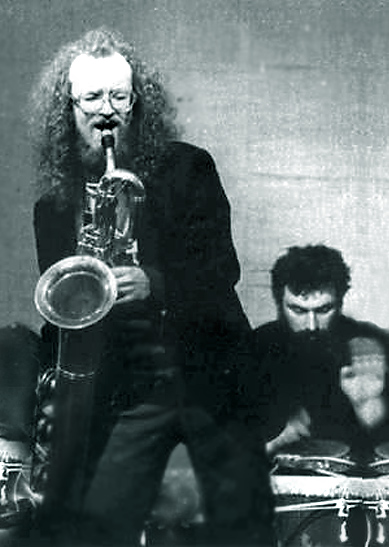
Sergei Letov Mikhail Zhukov Many musicians hesitated to quit their primary non-musical occupation.
Letov, for example, was a chemist and worked at a research institute,
but finally left the job, became a musician, graduated from Tambov
cultural institute and got a job of musician. Shilkloper was rotting
in the Bolshoi Theater. It was terrifying: one could easily get
between grindstones of various party and Komsomol mechanisms. A Place in the Sun
Everyone went through the changes in his own way. It is easier to
track by concrete events. One of the brightest figures was, certainly,
Sergey Letov. He was the absolute leader, and it is hard to deny. And
now he remains the most consistent representative of the Moscow
avant-garde, its image. Though in the very beginning, when I first met
him, he was absolutely uncompromising and contacted and performed only
with Bohemian artists, poets and musicians. He was different than
today. I remember, how Letov and Zhukov played a short and frantic
suite "Tyani-Tolkay" in 1982 - minimum pathos with maximum
expressiveness.
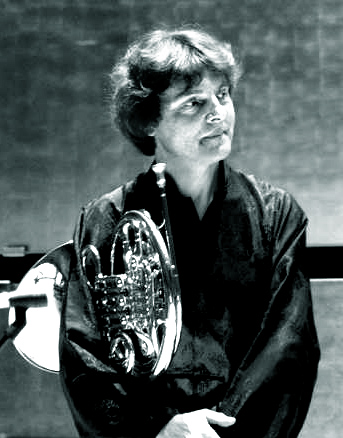
Arkady Shilkloper
I was lucky to see from the inside how his main project was born - TRI
"O". It so happened (and I'm proud of it) that I, not Shilkloper, was
the third member of this wind ensemble together with Letov and the
tuba player Arkady Kirichenko (the band was called TRI "O" later).
Letov invited me to play a small "flat gig" for foreigners, organized
by Artemy Troitsky. Our music was certainly far from TRI "O" program,
though we already included Oscar Pettiford's Blues in Closet in our
repertoire. Kirichenko sang a rollicking blues to Letov's cycle pump,
and Letov performed an Armenian erotic ballad a la Djivan Gasparyan.
The repertoire of the familiar TRI "O" was forming this way.
I failed to stay in this band: I had no chances, because my
participation supposed an inward movement, into the laboratory
environment, and Letov needed a virtuoso soloist, a star, a flamboyant
musician, who could excel Letov and Kirichenko both technically and by
musical education. The right person was Arkady Shilkloper. Of course,
his joining in was the beginning of the triumphant rise of the group,
but at the same time it was the movement away from this fruitful
magma, where Letov used to boil before the perestroika.
Such a community of so different people as TRI "O" allowed the
presentation of our music on many serious scenes: it was funny, it was
smart and bold. No wonder that many famous people from other artistic
circles recognized the musicians. For some period, TRI "O" performed
with the actor Alexander Filippenko, and it was quite different from
cooperating with participants of exhibitions on Malaya Gruzinskaya. It
was pure entertainment, a show. When this direction ran dry,
Shilkloper left the band and, correspondingly, the brightest page of
the TRI "O" history was turned, because the current line-up - the
bassoon player Alexander Alexandrov, the trumpeter Yuri Parfenov and
Letov - is a solid, but not very original group. Letov and his
partners have a very vast experience, but the present TRI "O" is not
perceived as an enlightening star on the Moscow musical horizon.
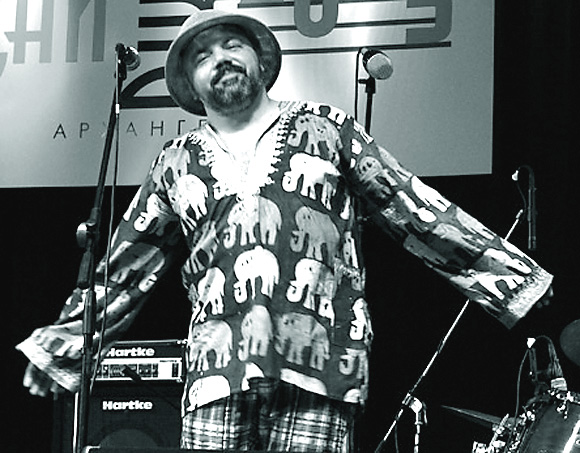
Arkady Kirichenko Like Letov, who was the brightest figure under the wing of Zharikov
and his band DK, many representatives of this informal community
started searching for contacts with a wide audience, which meant a
compromise and self-limitation. The saxophonist Viktor Klemeshev and
the guitar player Dmitry Yanshin founded a rock-group, which later got
into a more traditional groove - I mean the group Vesyolye Kartinki
(Cheerful Pictures). In the beginning it was Letov's project, playing
complicated instrumental rock-music with odd rhythms and atonal
improvisations a la Coleman's "harmolodics.” But later Vesyolye
Kartinki completely departed from Zharikov's DK and turned to an
ordinary blues-rock band. But the beginning was very promising; as far
as I remember, Olesya Troyanskaya sang with them - people called her
the Russian Janis Joplin, though she wasn't Janis at all, but was a
good avant-garde singer from the group Smeshchenie (Displacement). An
interesting multi-instrumentalist, Yuri Orlov, was mixing in the same
community. Lukin
However, the most original, the most mythical person at the source of
the Moscow jazz avant-garde was the saxophonist Viktor Lukin. He
became a myth mainly thanks to his closest apprentice, the person who
treated him as a saint. I mean Boris Labkovsky. Now Labkovsky, a very
refined musician, is mainly performing with Rada Tsapina (Rada and
Ternovnik), playing the sax and bass guitar. But in his time, when I
came across him, he was a very good drummer, able to produce hundreds
of sound nuances from a wracked Soviet drum kit, and he was very
convincing at that. According to him, stories of Lukin's life reminded
of Buddhist jatakas…
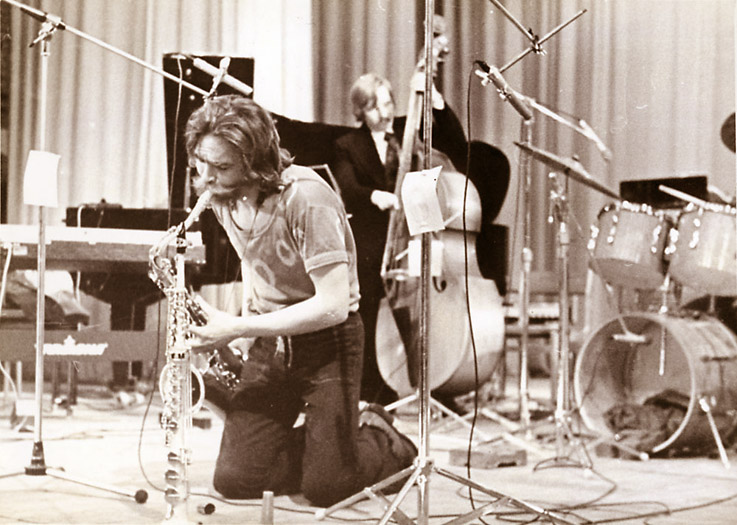
Viktor Lukin
Here's one of such stories. Once he came to the Moskvorechye studio.
He was told to learn a Coltrane's or Parker's solo. Lukin did not
understand why. "Why Coltrane can't learn something from me instead?"
thought the musician, walking though the studio corridors. Even here,
some people called jazz an art of free improvisation, not without
tremulousness. But Lukin took everything for granted: freedom of
expression for him was an absolute. Of course, Lukin was kept off the
stage, so he had to be cunning. With a borrowed jacket and tie on, the
saxophonist came to the dean's office and promised to play at the
reporting concert a paraphrase on the Russian folk song "A Birch-Tree
in the Field.” With a heavy heart, the administrators gave him the
green light. Lukin was playing for twenty minutes. Alone. Solo. He
roared double tides, first on his knees, then lying on his back and,
finally, standing on his head. "I just impersonated a birch-tree,” he
explained, twisting his moustache and grinning. The members of the art
directors had a hard time at the district party organization, and
Lukin was expelled. This is how the Russian free jazz was born.
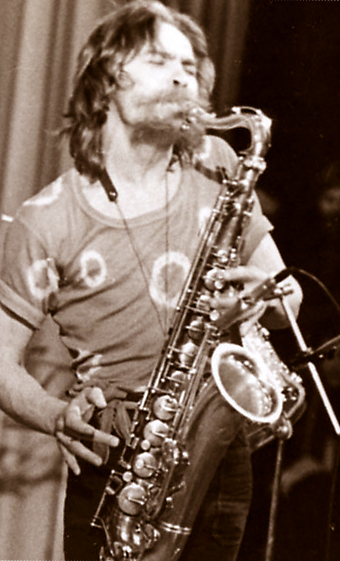
Viktor Lukin Soon Lukin left for the United States. People say that when he arrived
to Washington, first of all he addressed a policeman in broken
English: "How can I get to the White House?" The cop looked up and
down this shaggy tramp-looking man and, without saying a word, hit him
on the head with his club. Lukin realized that his free style would
not hit everyone's taste in America as well. He mainly played in the
open air. He sent a postcard to his apprentice Labkovsky to Moscow
with a brief note "Playing in the streets of Nu Jork".
After a while Lukin moved to India, then to Nepal. Information about
this period is very incomplete and fragmentary. Some said that he had
joint Tigers of Liberation of Tamil Ilam, some said he got a life
sentence and was put in a Nepal dungeon, others said he caught some
tropical disease and died alone in terrible pangs.
Today it is hard to find out what is true or false in these stories.
Lukin was just forgotten. Nobody noticed when he showed up in a
Russian embassy, wishing to come back. Too much has changed since he
was belching heart-rending sounds, standing on his head in a club in
the suburbs of Moscow. Interest in free jazz in Moscow declined, but
now we have our own White House. Cops are cops everywhere, so it is
safer to buy a guidebook and find your way by yourself.
Another figure, not less distinguished than Letov and Lukin, was the
drummer Mikhail Zhukov, who had his own percussion ensemble, called
Uneasy Music Orchestra. Many interesting musicians played there - the
percussionist Igor Zhigunov (later Megapolis), the arranger Aleksey
Nechayev, future MD&C Pavlov - Aleksey Pavlov from Zvuki MU, Dima
Tsvetkov, the drummer of Nicholas Copernicus. Zhukov's orchestra was a
part of the nonconformist scene, but then Sainkho appeared. Zhukov
started playing the "Tuvinian card" and it all ended up as ambiguous
bunch of ethnic banalities. At the Junction The Moscow avant-garde was developing at the junction of rock-music
and experimental jazz. Interest in Barban's theories led away from
this too simplified scheme; they required more philosophy,
metaphysics, more seriousness, Joyce, Freud, etc. Letov, for example,
always reckoned himself among prophets of the new sexual revolution in
music. But the most interesting experiments or events happened at the
junction of avant-garde jazz and rock, as I said.
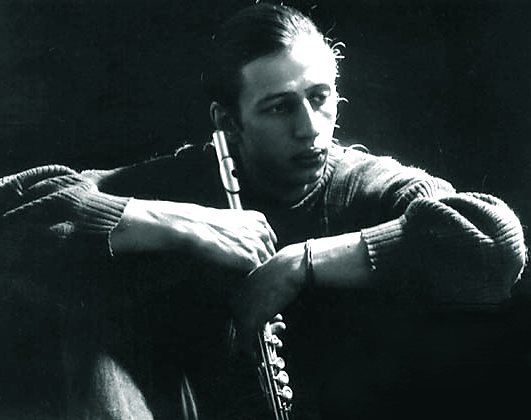
Alexander Voronin One of the examples is the guitarist Andrey Suchilin, who took Fripp's
courses, toured in Europe and played here with his project C-Major.
Once Suchilin had an excellent duo with the saxophonist Alexander
Voronin (in summer 1998 this excellent musician died in an accident).
They played whimsical compositions with minimalism elements,
skillfully transforming the famous Fripp's cyclic conception. I still
listen to some live unprofessional records left from those days.
Rai was an astonishing project of a very refined, interesting drummer,
Sergey Busakhin. Busakhin began as a jazz drummer, but then he turned
onto electronic noise music, and the group Rai was founded, which
probably resembled British jazz-rock avant-garde, though similar
projects could be found in the States, connected with Lower East Side
and Californian projects such as Mr. Bungle. Busakhin played with
jazzier projects, cooperated with the contrabass player Viktor
Melnikov. I was lucky to play with him several times.
It is rather strange, but the Moscow scene better manifests itself far
away from the capital, for example, at "Unidentified Movement"
festivals, organized by Sergey Karasev in Volgograd. As I already
said, much of what failed to become an event in Moscow and hit the big
stage was realized in the province, which showed more attention,
interest and respect. Bigger things are better seen from the distance.
I played in Volgograd four or five times. I best remember a
performance within a trio with Viktor Melnikov (contrabass) and Sergey
Busakhin (drums). I need to say a few words about Viktor Melnikov.
Unfortunately, the only record with his participation is one of the
discs released by the Moscow Composers' Orchestra, where he plays a
modest role of the second bassist together with Vladimir Volkov,
though he was an outstanding musician.
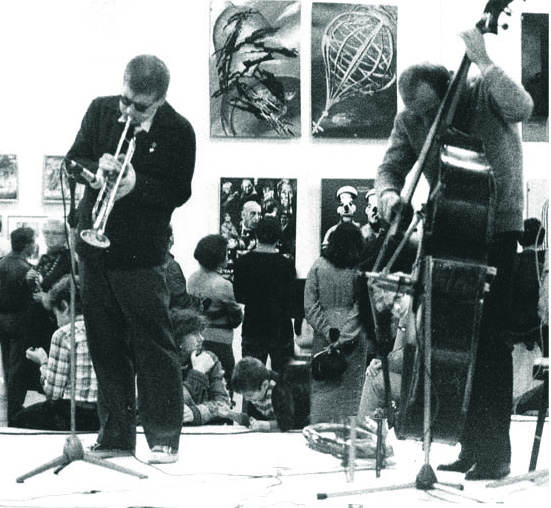
Andrei Solovyov Victor Melnikov
In the beginning of the 70's, Viktor Melnikov represented our country
at the Warsaw Jazz Jamboree, where he was impressed by the famous
British trio of John Serman (baritone saxophone), Barry Phillips
(contrabass) and Stuart Martin (drums). In their music he saw
possibilities for implementation of ideas of the Russia avant-garde
modal jazz. His numerous projects were attempts to make this dream
come true. I consider the trio of Zhukov-Letov-Melnikov to be a unique
ensemble with an immense potential and energy, which could develop in
a phenomenon not less than Ganelin's trio. Melnikov was an excellent
saxophonist; sometimes he would take the baritone sax and play
dramatic and energetic dialogs with Letov. For some time Melnikov was
the music director of the jazz club at the Bauman's Moscow Technical
University. The graduates of the Bauman's University included
(earlier, of course) Evgeny Gevorgyan, Nikolay Panov, Viktor Voytov. I
remember him using the famous chamber choir Gaudeamus from the same
university for performing a vocal-instrument jazz-rock suite with
Russian folk themes. All this was very refreshing and interesting.
At the junction of rock and jazz the groups Asphalt, Krysha (Roof),
Bolshaya Krysha (Big Roof) and other projects of Igor Grigoriev
emerged. This musician is also considered one of the key figures of
the Moscow improvisational scene. In the beginning of the 80's he
showed himself as a well-prepared, skillful and educated jazz
musician, a good connoisseur of the jazz guitar, a teacher and at the
same time a very open person, who had lived a wild rock'n'roll life.
He knew very well many veterans of the Moscow rock scene, but
deliberately chose the way of experimental jazz musicianship. I think
that Krysha's vinyl record (it was called "Krysha. New Music" - I
still have several LPs) is still interesting, and it's not only my
opinion as a participant. Recently I had a talk with the owner of
SoLyd Records, Andrey Gavrilov, and he said "What I would issue today
with great pleasure is Krysha's records, released by Melody Records".
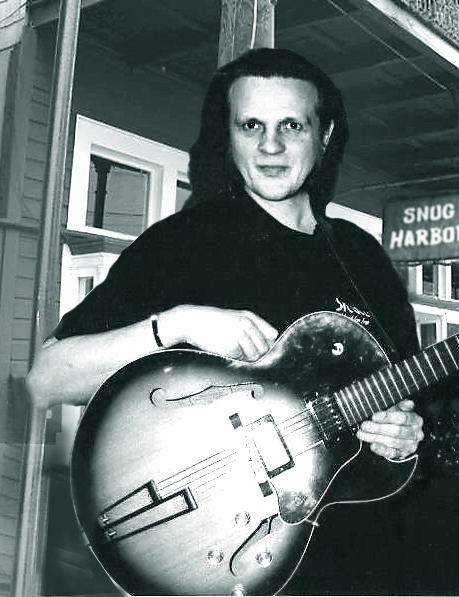
Igor "OGOGO" Grigoriev Igor Grigoriev formed Asphalt back in 1987. At the start this project
was developing "no wave" ideas. Igor Grigoriev listened to a lot of
such musicians as Jamaaladeen Tacuma, James 'Blood' Ulmer, Ronald
Shannon Jackson, and took to pieces all secrets of Coleman's "harmolodics.”
He asked me to join Asphalt, but I was busy lecturing. I remember him
calling one day, saying they had a very important rehearsal. I replied
that I also had an important chair meeting and didn't go. He didn't
try to persuade me any longer and took the electric violin player Dima
Khanukayev. The first line-up also included Mikhail Zhukov on drums
and Igor Zhigunov on the Ural bass guitar. It was a very good line-up
- an angry, energetic and very complicated music with twisted rhythms.
But Dima Khanukayev left for America soon. Igor Grigoriev attempted to
engage other musicians; the pianist Artyom Blokh played in the group
for some time, and with this line-up - Grigoriev, Zhukov, Blokh,
Zhigunov - the band went to St. Pete in 1987 to attend a very
important symposium, organized by Alexander Kan. I also was there,
reading a report at the morning session, and concerts took place in
the evening. Artyom Blokh was an excellent pianist, a real jazz
intellectual, but he did not quite match Asphalt. He also did not get
along with the leader.
Then Igor Grigoriev attempted to engage Letov to play at a big
festival of avant-garde jazz and rock, held near Moscow, in Khimki, in
a huge local cultural center (playing outside of the city was quite
common). I remember that Zhukov with his percussion orchestra played
at the festival, as well as Srednerusskaya Vozvyshennost (Central
Russian Upland), founded by the "toadstool" artists and Dmitry
Alexandrovich Prigov, a very interesting group in the vein of Rock in
Opposition. Igor Grigoriev showed a variant of Asphalt with Letov.
Soon people started talking about a new Letov's project. Igor
Grigoriev was a creative, but at the same time, very ambitious person.
So Letov did not participate in the group any more (however, when
Dmitry Ukhov persuaded the management of Melody Records to issue a
disc of Asphalt, he insistently recommended Igor Grigoriev to invite
Letov for the recording, but Grigoriev was uncompromising)...
In 1988 Igor Grigoriev called me again. We went to a festival in
Volgograd with a new line-up of Asphalt, including the drummer Aleksey
Pavlov (he went to the festival with Zvuki Mu), the bassist Aleksey
Soloviev (an interesting musician, not a relative of mine), Igor
Grigoriev and me. It was a very interesting performance; I have a
video, and I believe it was fun and very refreshing.
Not only musicians contributed to the development of the Moscow
avant-garde scene. Critics and organizers sometimes better and deeper
understood what was going on. Igor Lobunets, who worked at Govorit
Moskva Radio during its establishment, broadcasted wonderful Saturday
programs, devoted to experimental music: jazz, rock, avant-garde -
everything, absolutely open to anyone. By the way, it was Lobunets who
recorded the famous LP by TRI "O" in the Sovremennik Theater, which
later was issued by Melodia Records. This record had no Shilkloper's
sweetness, no Kirichenko's populism: it was a powerful and interesting
Letov's (!) disc, realizing the avant-garde edge of the group. Along
with Krysha's records, it is one of the key documents of that unique
epoch of the Moscow avant-garde.
Besides all that, the Moscow scene cannot be imagined without people,
who lived nearby and visited the city. Musicians from small provincial
towns, where it was very hard to develop for avant-gardists, used to
frequently visit Moscow. For some time they did not let the Moscow
avant-garde scene break to pieces and decay. These included Smolensk
avant-gardists Vladislav Makarov and Misha Yudenich, Eduard Sivkov and
Mikhail Sokolov from Vologda, Yuri Dronov and Alexander Sakurov from
Ivanovo. Power of Illusions
Talking about the Moscow avant-garde, it is impossible to mention big
bands. It may seem funny today, but in the beginning of the
perestroika, musicians wanted to unite and act as a united front. At
first, just separate timid attempts were made. This process was much
intensified by Sergey Kuryokhin. I remember how in 1983 the
saxophonist Anatoly Vapirov, Valentina Ponomaryova and Sergey
Kuryokhin played the famous concert in the Moskvorechye Cultural
center, and on the next day Kuryokhin performed at the MIFI Cultural
Center with a line-up, which was called Crazy Music Orchestra, not
Pop-Mechanics yet. He invited there anyone he could find: Letov, the
saxophonist Sergey Lukanov, "Africa" Bugayev, the bassist Dmitry
Shumilin…
I was lucky to take part as well. After the concert he played with
Vapirov the day before, Kuryokhin had a terrible hangover; he
complained about heartache and had to take validol. In spite of this
(or thanks to this) the concert was terrific. You may not believe, but
even now, tuning myself before coming out on the stage, I often try to
call back that concert and appeal to my inner experience, which I
gained during that concert, looking for that special vibe…
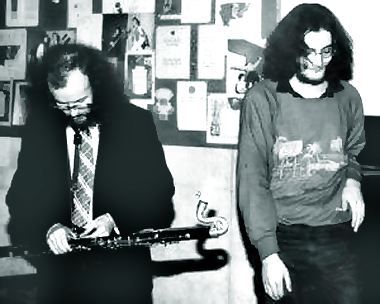
Sergei Letov Artyom Blokh
This joint performance with Kuryokhin was a strong impulse to do
something similar by our own. First, the omnipresent Letov took the
initiative: he united us in a small orchestra, which he called Afasia.
We gave a couple of concerts in the end of 1983 - beginning of 1984 in
Kautchuk Cultural Center. Artyom Blokh, whom I already mentioned and
who, by the way, was Kuryokhin's cousin, played the grand piano. I
remember him going frantic during one concert: he kicked away the
chair, took a boxing pose and knocked out the grand piano with several
smashing blows. Knocked-out keys were flying around…
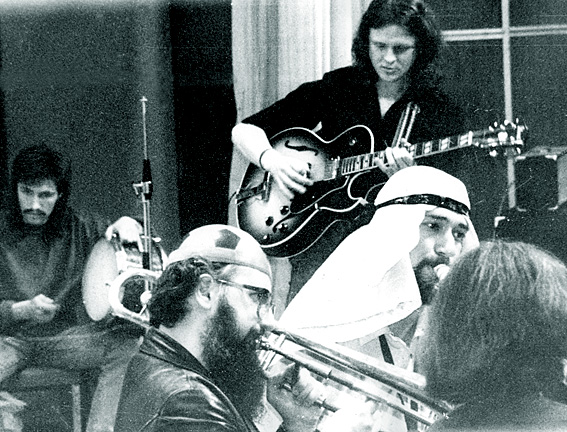
Bolshaya Krysha (Big Roof)
Igor Grigoriev had a similar orchestra called Bolshaya Krysha. This
project was specially organized to meet Misha Lobko, a very
interesting French musician, a bass clarinet player (he is best known
for recording with Misha Mengelberg). Lobko was going to open his own
record company and, like Leo Feigin, to release our musicians, issuing
a large box, similar with Document of Leo Records. He brought digital
equipment, never seen here by the end of the eighties. To declare
about himself, Igor Grigoriev gathered the orchestra Bolshaya Krysha
(Big Roof) for this record specially, having invited musicians from
Zhukov's ensemble and the people he played with in Asphalt.
In my turn, I called my friends-musicians - drummers Aleksey Pavlov
and Dmitry Tsvetkov, the guitar player Konstantin Baranov (later of
Alliance), the keyboardist Boris Monastyrev (now known as Boris Diart),
saxophonists Sergey Lukanov and Alexander Ioltukhovsky. All
compositions were written by Igor Grigoriev, skillfully inserting
fragments from Asphalt, conducting the orchestra in a very peculiar
way, playing guitar solos at the same time. I remember that Nikolay
Dmitriyev (!) played the trombone; I have pictures taken during this
performance. I met Kolya Dmitriyev at some audiophiles' gathering,
where people exchange, sorry, speculated vinyl discs. We get along
very quickly, feeling some mutual sympathy, and soon he started
inviting me home. First we were just friends, listened to free jazz
together, visited lectures of Leonid Pereverzev, Dmitry Ukhov and
Aleksey Batashev.
Our first joint project was the magazine Delo (Affair), which we
published during the perestroika. Those days there were two very
impressive underground magazines - on the one hand, the very serious
and interesting Kvadrat (Square), published by Barban in St. Pete, and
on the other hand, there was Sergey Zharikov with the witty magazine
Smorchok (Snot).
We decided to make something similar, but focused on improvisational
music and jazz. I can't judge how we succeeded, but it was very
fascinating in the beginning. Everything was made up on paper of a
regular format, on which we glued pictures and made collages. We took
pictures and printed them as post cards in 20-30 copies and sent them
to different active people, involved in organization of music events.
We sent out first ten issues, and nobody knew who we were, because all
materials were unsigned. People used to tell us "Do you receive this?
Some freaks have sent us this magazine…" Later Zharikov started
frightening us that all of us had been already "registered there,"
that he had already been dressed down for his Smorchok, and that they
would surely come for us (it was the time of another campaign against
underground press - editorial comment), but we did not give up. We
published news, where real and fictitious events were mixed up without
any explanation. We had regular columns, for example, "Blind Test": we
selected records of Russian musicians and gave them to Chekasin,
Kuryokhin, Gayvoronsky and other musicians and they tried to guess or
just rate them. It was fun. We published reviews of new records,
concerts, events - all around the new improvisational music. For
eighteen months we issued about twenty numbers, and, thank God, nobody
came for us…
It is interesting to know that Nikolay Dmitriyev was the founder of
the DMUT movement (Home Musicianship of Oral Tradition). People
gathered at his place and everybody played numerous semiprofessional,
self-made and children's musical instruments. It was during the "port
wine epoch," in the 70's - beginning of the 80's. I would not say that
there were many famous people there, mainly intellectuals with good
musical tastes. Musicians were not much interested in taking part in
such fun. But it was interesting for all of us and it reflected the
spirit of those madcap and unselfish days. Kings and Cabbage The most distinguished project of the Moscow scene - Moscow Composers'
Orchestra - was founded in 1985, after experiments with Kuryokhin and
Afasia. It happened soon after the first performance of Pop-Mechanics
on April 14, 1984 on the stage of Moskvorechye Cultural Center
(Pop-Mechanics #1 was launched in Moscow, curiously enough, under the
wing of the consistent traditionalist Yuri Kozyrev). Of course, this
performance produced a great impression on us. Certainly, all of us
were on the stage that evening.
The basis of the Kuryokhin's band was the orchestra of Viktor Melnikov.
Melnikov cooperated with Kuryokhin many times, participating in joint
projects at festivals in St. Pete, Yaroslavl and Novosibirsk. They
understood each other with a half word. After that, a Moscow analog
could not but appear. So it was decided to organize Moscow Composers'
Orchestra. I was making arrangements. We rehearsed in the Bauman
University and prepared a long and powerful program.
We played it several times in 1985-86: the first performance happened
in Medics Cultural Center on Gertsen Street (now Bolshaya Nikitskaya),
where Helicon Opera is located now. Then we played in a very good
large hall of the famous cultural center of Dynamo Plant at
Avtozavodskaya subway station, where Sergey Zharikov was rehearsing.
Alternative concerts were held there (technical services were provided
by the well-known electronic and sound engineer V. Osinsky). Later the
orchestra played at a festival in the cultural center of the
Sverdlov's factory, at one of the first Alternative festivals, in the
very end of the 80's. I was the band leader, and Nikolay Dmitriyev was
the director.
Our first program was called "Galley's Comet" (this comet was
approaching the Earth, like in 1812); another program was called "Mandragora".
Nikolay Dmitriyev presented me to my birthday with some LP with the
following dedication:
Galley's comet flies around,
Mandragora is deep in the ground.
Soon we'll hear Andrey growl
Form a black plastic disc with a hole…
Then we took a pause. For several years the orchestra did not play,
because many people - Letov, Shilkloper, Kirichenko - started touring,
spending much time abroad, enjoying their stardom, and it was
difficult to involve them in democratic cooperation. Igor Grigoriev
moved to the USA and settled down in Los Angeles. But Dmitriyev and I
did not stop hoping, and at some moment decided to revive the Moscow
Composers' Orchestra. We decided to come around and invite a new
leader from outsiders. We chose the pianist Vladimir Miller, who lived
in London. We thought that he, a new and neutral person, would lead
the Moscow new jazz team for some time (soon I realized that we had
made a fatal mistake, but it was too late).
In the beginning everything looked fine. Miller made interesting
musical scores, offered some variants for recording and soon released
the first disc at Leo Records. It slightly reanimated the process in
general. The thing is that orchestra management requires a lot of
paperwork. Improvisation is improvisation, but it is important that
the basic theme is fixed somehow. Being an orchestra, musicians cannot
just play whatever they want on the basis of freedom of expression -
with a large line-up this sounds very boring, transforming into a
noise. Sometimes a specific compositional technique can be used, when
all the bandsmen kick over the trace; it sounds powerful, there is
something amazingly wild about it. Nevertheless, using capabilities .
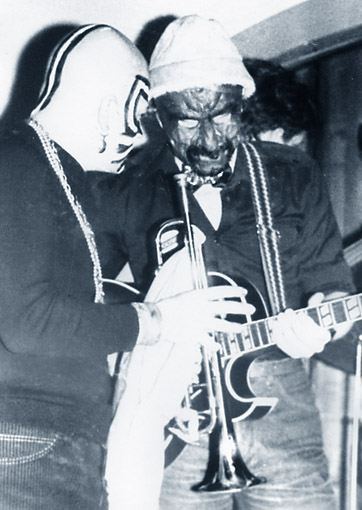
Andrei Solovyov Igor "OGOGO" Grigoriev
Andrei Solovyov
Moscow
|